WATCH: Iran's supreme leader Khamenei weeps at general Soleimani’s funeral
Iranians poured on to the streets of the capital Tehran to bid farewell to the commander of the Quds Force
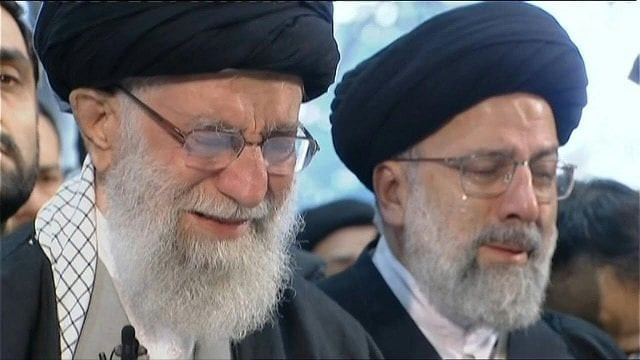
The supreme leader's voice cracked with emotion as he said prayers, forcing him to pause. SCREEN GRAB
Iranians poured on to the streets of the capital Tehran to bid farewell to the commander of the Quds Force, the unit in charge of foreign operations of Iran's Revolutionary Guards. State media said they numbered in the millions.
The scale of the crowds, shown on television clogging major streets, was the biggest since the 1989 funeral for the founder of the Islamic Republic, Ayatollah Ruhollah Khomeini, and leader of the revolution that set Iran on its political collision course with Washington.
The supreme leader's voice cracked with emotion as he said prayers, forcing him to pause. Crowds chanted "Death to America". One poster held by a mourner read: "It is our right to seek a harsh revenge," echoing comments by Iranian military and political leaders.
Many Iranians considered Soleimani, a decorated veteran of the eight-year war with Iraq, a national hero, particularly for mobilising Shi'ite Muslim groups in neighbouring Iraq to help crush the militant Sunni forces of Islamic State.
The death of the general, widely seen as the second most powerful figure in Iran after Khamenei, has prompted a rare public display of unity at home after deadly anti-government protests in November and before parliamentary elections in February. It has also drawn some allies abroad closer to Iran.
"The martyrdom of Soleimani is for sure a turning point for the establishment, at home and abroad. His death, at least for now, has united Iran," a former senior pro-reform Iranian official said.
The coffins of Soleimani and the Iraqi militia leader, Abu Mahdi al-Muhandis, who was also killed in Friday's attack, were draped in their national flags and passed from hand to hand across the heads of mourners in central Tehran.
Khamenei adviser says Iran response to US to be 'military'
The funeral ceremonies will culminate with Soleimani's burial in his home city of Kerman, in southern Iran.
Show of support
Traditionally, Muslims are buried swiftly after their death, often the same day. But Soleimani's body has first been taken to cities in Iraq, where Iran has vied with the Washington for influence since the 2003 US invasion, before being carried around Iran.
Crowds have crammed the streets in each of the cities, a welcome show of support for the authorities in Iran, whose economy has been crippled by new US sanctions imposed after Washington quit a nuclear pact between Tehran and world powers.
US President Donald Trump has said the US military had drawn up a list of 52 targets, the same number of US Embassy hostages held for 444 days after the Iranian revolution, that he said would be hit if Americans or US assets were attacked. Trump said the targets included cultural sites, comments that have drawn criticism from his US political opponents.
"America and Zionism should know that my father's martyrdom will lead to awakening ... in the resistance front and bring about a dark day for them and flatten their homes," Zeinab Soleimani, the commander's daughter, told mourners.
Iran usually refers to Israel as the Zionist state and describes regional countries and other forces opposed to Israel and the United States as a "resistance" front. "Crazy Trump, don't think that everything is over with my father's martyrdom," she said in the televised address. Iran's allies in the region also gathered for the funeral. Ismail Haniyeh, leader of the Palestinian militant group Hamas, told the ceremony: "Resistance against the Zionist project on the land of Palestine will not stop, and resistance against the American dominance will not be broken."
Haniyeh was on his first trip to Iran since becoming leader of the group in 2017. Iranian commanders have issued a range of threats since the US strike at Baghdad airport, without being specific.
"Even killing Trump is not a sufficient vengeance, and the only thing that can pay for the blood of martyr Soleimani is completely expelling America from the region," Revolutionary Guards Aerospace Force chief Amirali Hajizadeh said.
The Iraqi parliament backed a recommendation on Sunday by the prime minister for all foreign troops to be ordered out of Iraq after Soleimani's death united rival Iraqi Shi'ite leaders, even those opposed to Iranian influence.
"Trump will see the result of this adventurism in the region," Iranian Deputy Foreign Minister Abbas Araqchi said, citing the Iraqi vote. Tehran has often said it would choose the time and place of any retaliation in past standoffs with Washington.
Video courtesy: Evening Standard

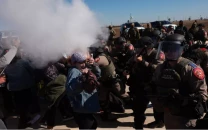
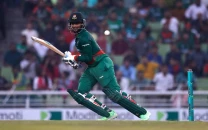
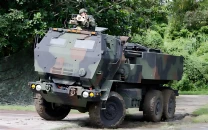
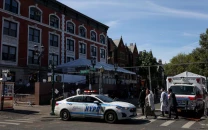














COMMENTS
Comments are moderated and generally will be posted if they are on-topic and not abusive.
For more information, please see our Comments FAQ